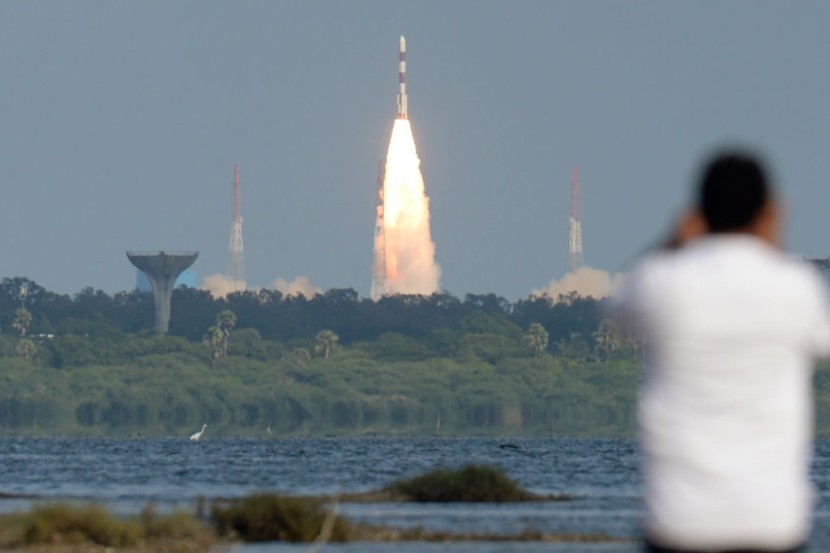
India launched a rocket with 36 private broadband satellites early Sunday morning to keep the orbital constellation expanding after a few months of delay caused by the Russia-Ukraine war.
It marked the first launch for London-based OneWeb after parting with the Russian Space Agency in March over the Ukraine war, according to AP News.
India Space Agency chair S. Somanath reported that they have "accomplished the orbit very accurately," and now the rocket is in its target orbit.
He reported successfully launching 16 satellites into orbit and voiced certainty that the other 20 satellites would be successfully detached.
Now that 462 of OneWeb's satellites are operational, the business has more than 70% of the spacecraft it needs, including India Satellite, to fulfill its global broadband service commitment.
Despite the inconvenience this year, OneWeb stated that it remains on schedule to launch a network of 648 satellites that would provide worldwide coverage next year.
India's Heaviest and Biggest Rocket
The average weight of a OneWeb satellite is 330 lbs (150 kilograms) in the India Rocket Launch.
This was OneWeb's 14th satellite launch, and it used India's largest rocket, which is typically reserved for military satellites, according to Al Jazeera.
OneWeb's history of launches begins in 2019, with the first flight using Russian rockets.
Congratulations Bharat!
— Aviator Anil Chopra (@Chopsyturvey) October 23, 2022
ISRO successfully launched its heaviest rocket (6ton), Launch Vehicle Mark 3 (LVM3) and placed 36 Satellites of OneWeb India-1 in the Circumpolar Near Earth Orbit, WebOne Satellite System will have a total of 588 Satellites arranged in 12 Orbital Planes pic.twitter.com/gJmbfLZ2Tj
Director of the Observer Research Foundation in New Delhi specializing in space and security Rajeswari Pillai Rajagopalan told the Associated Press that the deployment is significant for India and shows the increasing openness of its space agency to commercial clients.
Read Also : Starlink Internet in Iran? Here's Why Joe Biden Wants Elon Musk to Bring SpaceX Service in Middle East
Rajagopalan stated that India launched smaller satellites before, and the country has been aiming to corner the market as a satellite launch facility. The ongoing conflict in Ukraine may present an opportunity for India, as several nations have abandoned Russian launch services due to Moscow's attack on Ukraine.
In cases when non-geosynchronous orbits need to be serviced, the LVM3 (Launch Vehicle Mark-3) is used instead of the GSLV-Mk3 (Geosynchronous Satellite Launch Vehicle Mark-3). It's the most powerful and biggest rocket India has ever built. It launched from Satish Dhawan in Andhra Pradesh at 00:07 Sunday (19:37 BST, Saturday), as per a BBC report.
At a height of 600 kilometers, unloading all of the satellites took an hour and a half during the India Rocket Launch. The spaceships will take a few weeks to reach their 1,200 km (750 mi) polar operating orbits using their ion engines.
This is huge - has placed India as a significant global player in the commercial satellite launch market pic.twitter.com/4vI9dXNi4T
— Bharat (@Bharatmkm) October 22, 2022
OneWeb had to act rapidly to hitch rides on other carriers with only two-thirds of its satellites in space.
SpaceX and Relativity Space, two American rocket companies, and New Space India Limited, the commercial branch of India's space agency, Isro, have all signed contracts to market and distribute the LVM3.
More Launches Soon
High-speed Internet access is available to beta clients in latitudes of more than 50 degrees North and South right now, thanks to OneWeb. Two more launches are scheduled for this year, bringing coverage closer to the equator with each one.
According to OneWeb CEO Neil Masterson, the company is targeting to conduct OneWeb Satellite launches before Christmas that will allow the activation of their services in 25 degrees North and South.
He added that the constellation's deployment will be finished by spring, enabling OneWeb to provide worldwide commercial service by the end of 2023.
OneWeb and Paris-based Eutelsat have discussed merging since March.
The French company uses communications satellites in orbit 36,000 kilometers above the atmosphere, called Geostationary Orbit. They are a major player in the direct-to-home television industry.
Related Article: India: Why Does Google Need To Pay $162 Million?








